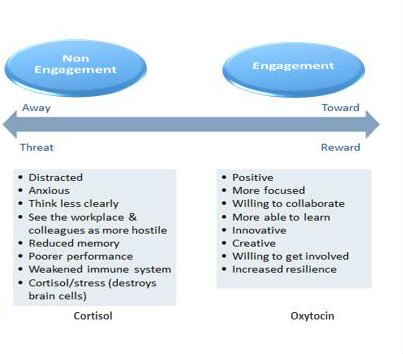Many people are now realising that inclusion (engaging with your staff to make them feel part of the team, or more importantly the organisation) is one of the key constructs to all things great in an organisation including improving safety, quality, productivity, wellbeing and sustainability, to mention a few.
From neuroscience research we understand that engagement, or lack of, is critical in determining whether we feel we are part of an ‘In group’ or ‘Out group’. The impact of either has dramatic consequences for people and the organisation as a whole and therefore impacts on sustainability of the organisation in many ways.
Being part of the ‘In/Out group’ relates back to our ancestral survival where the brain craved two things (and still does) … Survival by avoiding threat (sabre tooth tiger) and survival by getting rewards (food and shelter). The social impact of not being part of an ‘In group’ is covered well in Matthew Lieberman’s work, “Social -Why our brains are wired to connect”. Essentially our brains check to see if we are accepted or rejected, and rejection has a significant impact on our ability to think; not a great place for anybody to be, especially at work.
Nita Clarke and David Macleod state in ‘Engaging for success’ that ‘Engaging Managers’ is one of the four pillars of Engagement along with Strategic Narrative, Employee Voice and Integrity in Leaders. Managers and leaders, at all levels therefore have to ensure and work hard to make their team feel part of the team or “In group”.
From the neuroscience research we can show that the In /Out groups exhibit the following values and behaviours:

Diagram from Hilary Scarlett's Engage for Success
As you can see from the list, the engaged people are much more likely to give you that sought after discretionary effort which every company needs, even to be compliant, let alone to get beyond compliance to a continuously improving workplace in terms of safety, quality, and productivity. The impact of natural drugs (Cortisol and Oxytocin) has significant impact on both short and long term health issues as well so organisations need to become ‘Oxytocin dealers’ (it’s legal) to ensure success.
The social impact of organisations expands even further in terms of organisational sustainability and resilience where recent work has shown that shared values means shared values with local communities as well as with internal groups. Organisations should now have to think carefully about the balance between shareholder returns and wider social values. i.e. how the organisation adds value and how it impacts on society, much as social recognition impacts on individuals. (I would surmise that shareholders should be thinking along similar lines but hey, that’s politics!)
If you don’t get social inclusion you’re going to struggle to get collaboration and innovation. If you don’t get innovation then your organisation is simply not sustainable. That’s the power of engagement!
Related articles
-
Covid-19 and good work: stories from Catalyst grant winners
Emma Morgante
Winners of an RSA grant to deal with the impact of Covid-19 on the world of work.
-
We make work better, one place at a time
NP Lee Norburn ME
Find out how the RSA Fellowship are reinventing work in the South West and beyond.
-
Early-stage income assistance for Community Contributing Enterprises (CCEs)
Ian Lacey
From simple ideas like a local community bus service right through to initiatives like Ty Solar by Western Solar, this blog considers if similar ideas and possibilities could be initiated through a new model of income-assisted CCEs.



Be the first to write a comment
Comments
Please login to post a comment or reply
Don't have an account? Click here to register.